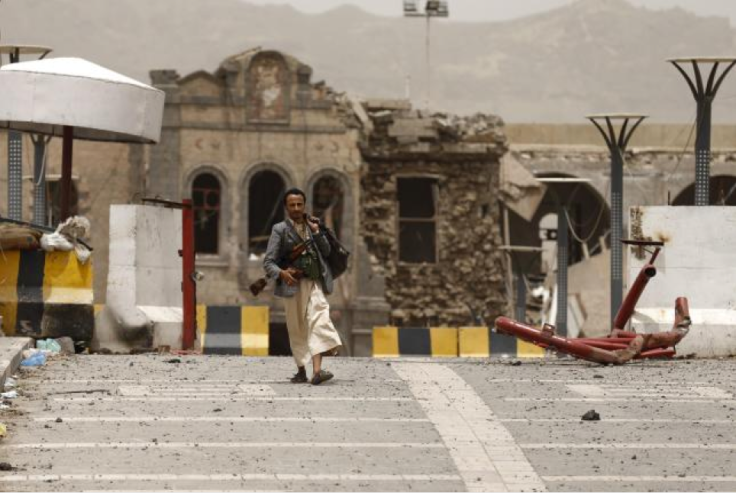9 Killed In Saudi-Led Airstrike On Area Inhabited By Yemeni Ex-Leader’s Relatives

Nine people were killed when Saudi Arabia-led coalition warplanes bombed a district in the Yemeni capital Sanaa inhabited by relatives of ex-President Ali Abdullah Saleh, residents and medics said. The air raid, also wounding at least 60 people, came ahead of planned United Nations-sponsored talks in Geneva aimed at ending Yemen’s conflict that has drawn in regional powers, including the world’s top oil exporter Saudi Arabia.
Residents said the warplanes had targeted vacant houses in Bait Me’yad, a district near the heart of Sanaa that is home to a number of relatives of Saleh, whose loyalists are allied with Houthi forces, the dominant armed faction in the conflict.
Mohammed Yahya, an eyewitness, said two missiles struck two Saleh relatives’ houses while a third crashed in the middle of the neighborhood, causing several casualties. Another witness said three explosions shook the neighborhood. “We felt as if the house was going to collapse over our heads,” said the man, identified as Ali Ahmed. “We ran, with the children, and hid under the stairwell. It was terrifying.”
Medical sources said nine people who had suffered severe injuries died on arrival at hospital while 60 others were under care at three hospitals in the capital.
Saleh remains influential in Yemen through his control of the former ruling party, the General People’s Congress, and the loyalty of many in the military, despite having stepped down after mass protests in 2011 against his long authoritarian rule. He subsequently made common cause with the Houthis, members of the Zaydi branch of Shiite Islam who seized control of Sanaa last September and forced President Abed Rabbo Mansour Hadi to flee the Arabian Peninsula country.
The Saudi-led coalition is attempting to restore Hadi to power. The Houthis, who have advanced across wide areas of Yemen, say they are pursuing a revolution against corruption and Sunni Muslim militants, and deny any military or economic links with Iran, which also says it accords them only diplomatic support.
Western powers and the Arab alliance fear Iran, via the Houthis, is trying to extend its regional influence into Yemen.
The World Health Organization said Friday that 2,584 people had been killed and 11,065 injured in the conflict, which has wrought a worsening humanitarian crisis.
UNICEF said Thursday that 80 percent of Yemen’s population -- more than 20 million people -- now needed humanitarian assistance after more than two months of airstrikes and heavy factional fighting.
Friday, six people were killed and a part of Sanaa’s historic Old City, a world heritage site, was destroyed in an air raid. Saudi Arabia denied targeting the Old City.
UNESCO Director-General Irina Bokova has said she was distressed by the loss of lives and “by the damage inflicted on one of the world’s oldest jewels of Islamic urban landscape.”
The U.N. said Friday that talks between Yemen’s warring parties scheduled for Sunday has been delayed by one day to Monday as one delegation was arriving late in Geneva.
(Reporting by Mohammed Ghobari in Sanaa; Writing by Sami Aboudi; Editing by Mark Heinrich)
© Copyright Thomson Reuters {{Year}}. All rights reserved.





















